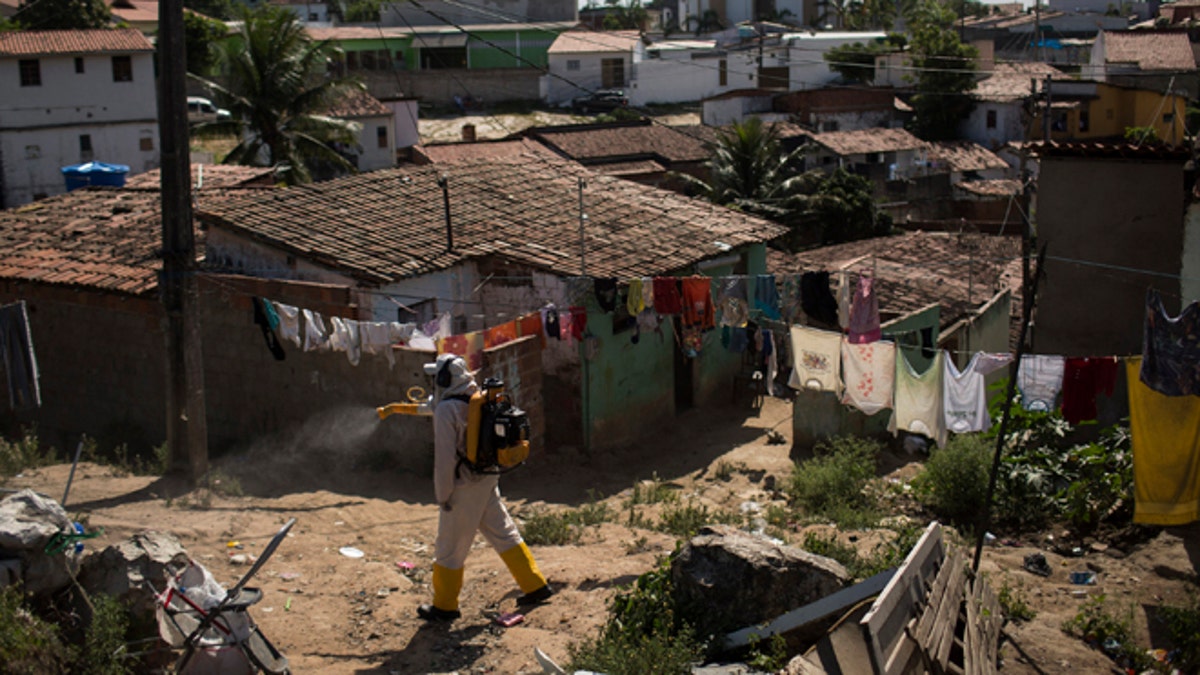
FILE- In this file photo dated Feb. 12, 2016, a municipal health worker sprays insecticide to kill Aedes aegypti mosquitoes, which spreads the Zika virus, in Campina Grande which appears to be the epicenter of the Zika virus outbreak in Brazil, Feb. 12, 2016. During a World Health Organization briefing Tuesday May 17, 2016, in Geneva, Dr. Margaret Chan said âthe more we learn about Zika, the more worried we get about it.â while stating it does not recommend canceling or postponing the upcoming Rio de Janeiro Summer Olympics, WHO recommends athletes and travelers take measures to prevent being bitten by mosquitoes. (AP Photo/Felipe Dana, FILE) (Copyright 2016 The Associated Press. All rights reserved. This material may not be published, broadcast, rewritten or redistribu)
Rio de Janeiro – "This is not an Olympic issue," Rio de Janeiro's mayor, Eduardo Paes, told a reporter when he was asked about the possibility that a Zika outbreak might happen during the Games. "The Olympics are taking place when the mosquito is not procreating, not active. August and July are the driest months, and they’re less warm, so you have a lower incidence of mosquito bites," he said.
The Olympics are set to take place from Aug. 5 to 21 in Brazil’s second-largest city, followed by the Paralympic Games from Sept. 7 to 18. Tens of thousands of athletes and fans from every country on Earth will flood Rio in that time, only to return home potentially having been exposed to the Zika virus.
It’s a scenario that might concern any epidemiologist.
Even so, no "special preventive actions" like fogging with pesticides will be taken during or before the Olympic Games, Cristina Lemos, the city’s Health Department superintendent told Fox News Latino.
"We will not direct our campaign at tourists,” she said. “We're just instructing them to use personal protection, like long-sleeved shirts, long pants and to avoid exposure to places that may have mosquitoes.”
“And also to use insect repellent," Lemos added.
But many are skeptical of the city’s preparations.
"We are counting on luck, we are counting on weather,” Brazilian biologist Mario Moscatelli told FNL. "The problem is that a city hosting an event like this should be taking actions to prevent the spread of disease, not depend on external factors.”
He added that while it’s true that winters in Rio are relatively cooler and drier, “The mosquitos are still out there, and any change in weather – and we have seen extraordinary changes in these last months – could cause a disaster. The neighborhood where most of the competitions will take place is also where we have the highest concentration of Zika and dengue fever cases."
The numbers would seem to validate his concern. Since April 2015, more than 100,000 Brazilians have contracted the Zika virus – which has been linked to the increase of cases of microcephaly, in which babies are born with abnormally small heads.
Although summer ended two months ago, in May the country’s southeast region, where Rio is located, surpassed the northeast, where the epidemic began in 2015, in number of cases of Zika with 46,318, according to Brazil’s Health Ministry.
The Zika virus is spread by the Aedes aegypti mosquito which also transmits dengue and yellow fever. The mosquito breeds in small pools of stagnant water that collect in and around residences, such as flower vases, buckets, old tires, even wet floors and in the tanks of toilets.
Lemos, the health department official, said that the city has more than 3,000 agents deployed throughout the city to inspect places where Aedes mosquitoes are most abundant. They visit homes, she said, educating residents about how to protect themselves, “searching for water deposits that can become potential breeding sites … [and] treating with pesticide larval deposits that cannot be eliminated.”
In extreme cases, she indicated, they would spray homes with insecticide.
Lemos also said that squares, parks, clubs, parking lots, stadiums, vacant lots and other sites are being regularly inspected.
But Moscatelli, with his expertise in biology, is not convinced. "We did almost nothing in the last 20 years to prevent the spread of Aedes. Seven years ago we were chosen to host the Olympics, which gave us a second chance, but nothing was done. What can we do in two months? Pray for the weather to behave. That’s it."




















